Over the past decade, global economic growth rates have continuously declined. The extent of this trend, influenced by developments in digital technologies, are yet to be fully captured. Today, numerous national efforts are deemed to be largely ineffective in terms of their responsiveness to new and emerging social, economic and political landscapes. What are the strategic directions and policy roadmaps for a thriving digital economy that spans the Arab World? This is what the Arab Digital Economy Strategy aims to achieve. Here’s how we can make it a reality.
Technological Developments as Drivers of Economic Growth
On a global scale, digital transformation is seen to have a positive impact on GDP, including GDP per capita. In fact, the literature suggests that countries that succeed at digital transformation become more prosperous than their counterparts who fail to do so.
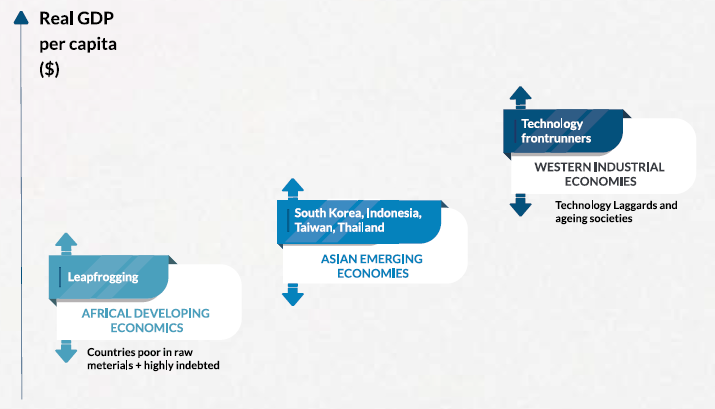
Figure 1: Global Wealth Redistribution due to Digitalization – Source: (Petersen, 2019)
Within the context of global digital transformation, Arab countries are largely lagging behind. This is substantiated by a host of economic indicators demonstrating weak levels of competitiveness and continuously increasing unemployment rates, pointing to considerable vulnerabilities in their economies.
It is therefore fundamental for policy makers to understand the complexity of digital transformation and the ways in which technology is changing the rules of the game, in order to cope with the paradigm shift brought about by digitalization. It is also imperative to understand the role of technological evolutions in building resilient economies and inclusive social systems.
"Passive and reactive national policies, or reliance on individual action plans, will not only be unfeasible, but impossible"
Arab Digital Transformation and Competitiveness
Many nations are making rapid strides in their digital transformation efforts believing that it is a precondition to compete on the global stage. According to the IMD World Digital Competitiveness Index[1], governments around the world are investing heavily in digital economy initiatives with the goal of enhancing value creation and national prosperity.
The report suggests a correlation between a country’s GDP per capita and the state of advancement of its digital ecosystem, whereby an increase in the use of digital technologies triggers countries to become more competitive overall thus achieving further growth in GDP per capita. In fact, countries ranking in the Top 20 in terms of digital competitiveness also rank in the Top 20 in respect to their GDP per capita, which exceeds US$ 20,000 in every Top 20 nation.
Only three Arab countries appeared in the 2019 Index: UAE, Qatar and Saudi Arabia. The main reasons for the exclusion of most Arab countries, as explained in the report, are existing regulatory frameworks, legislations and access to capital.
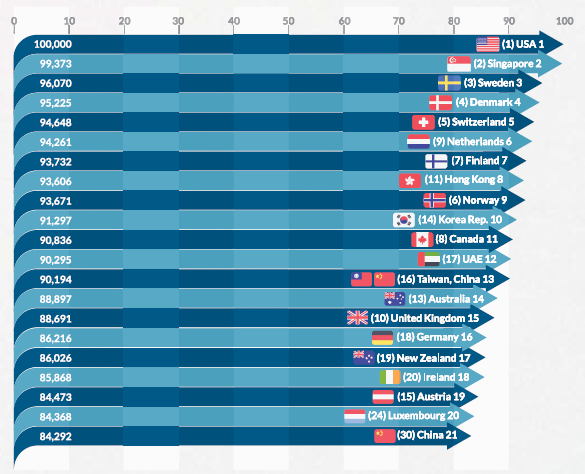
Figure 2: Digital Competitiveness Ranking – Source: IMD World Digital Competitiveness Index 2019
"The stark contrast in terms of performance between Arab and European Union countries demonstrates the impact that cooperation and joint planning, or lack thereof, can have on a country’s knowledge, economic capabilities, and competitiveness"
Similarly, the 2019 Global Competitiveness Report by the World Economic Forum[2] confirms IMD’s findings. The UAE ranks as the most competitive country in the Arab region, ranking 25th overall, and Yemen as the least competitive as 140th out of 141 countries. Meanwhile, at the top of this ranking are countries of the European Union with the Netherlands ranking number 4 overall, the highest for EU member countries, and Greece the lowest at number 59.
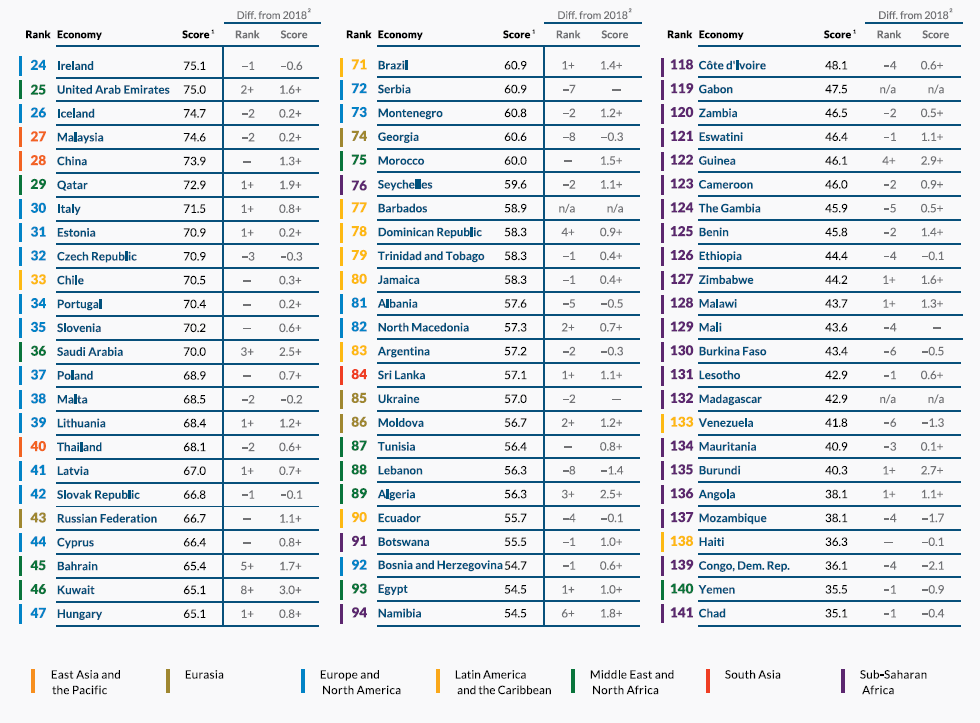
Figure 3: 2019 Global Competitiveness of 141 Countries – Source: World Economic Forum (2019)
The stark contrast in terms of performance between Arab and European Union countries demonstrates the impact that cooperation and joint planning, or lack thereof, can have on a country’s knowledge, economic capabilities, and competitiveness. This also highlights the lack of clear and unified focus across the Arab economies. More troubling is the low appetite to cooperate and benefit from shared experiences and resources in the region.
How can we develop a more coordinated strategy to address these common barriers and drive economic developmental in the digital age across the region?
The Arab Digital Economy Strategy
As a blueprint for strategic action towards building a sustainable digital economy in the region, in 2018 the League of Arab States, through the Arab Economic Unity Council, developed the "Arab Strategic Vision for Digital Economy" as a guiding tool for economic development in the digital age.[3] The vision views the development of a thriving digital economy as a catalyst for a sustainable, inclusive and secure future for the Arab world.
The Arab Strategic Vision for Digital Economy is based on a five-dimensional framework of digital transformation. The plan includes 50 initiatives and projects, and takes into account the current maturity levels and competitiveness of each Arab country.
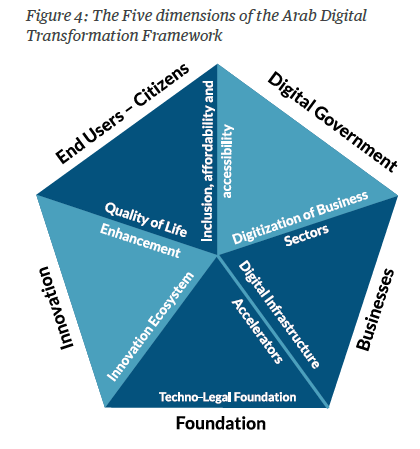
The first foundational dimension seeks the build-up of the necessary digital infrastructure meant to accelerate digital transformation. This dimension is largely based on techno-legal foundations and requires the existing legal systems in the region to take account of the blurring boundaries of jurisdictions and update outdated laws in order to make them relevant for the digital space.
Once that barrier is removed, this can then be a foundational building block for developing an innovation ecosystem that fosters creativity and accelerates digital transformation and contribute to fostering a digital economy.
This shapes the direction of digital government agendas towards being more innovative, accessible and inclusive. Digital governments need to accelerate the implementation of a range of reforms as a means to encourage the creation of more dynamic and sophisticated digital business environments, modernize education systems, improve the standards of healthcare, achieve food security targets, build industry-driven economies and enable e-commerce platforms.
Overall, digital technology is assumed to contribute significantly to the foundations of economic and social development objectives in the Arab Digital Economy Strategy as visualized in Figure 5.
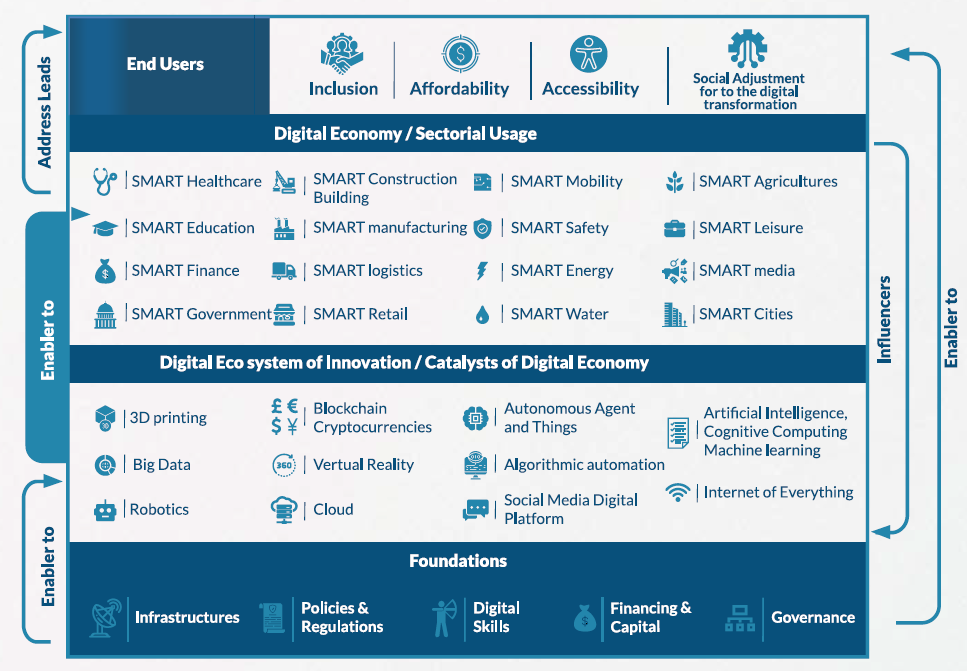
Figure 5: Proposed Framework of the Arab Digital Economy Strategy
Operating Model and Implementation Stakeholders
For the purposes of the strategic vision, 22 Arab countries were divided into three clusters based on their current competitiveness and digital readiness levels.[4] To implement the strategy, an action plan with a wide spectrum of stakeholders is required.
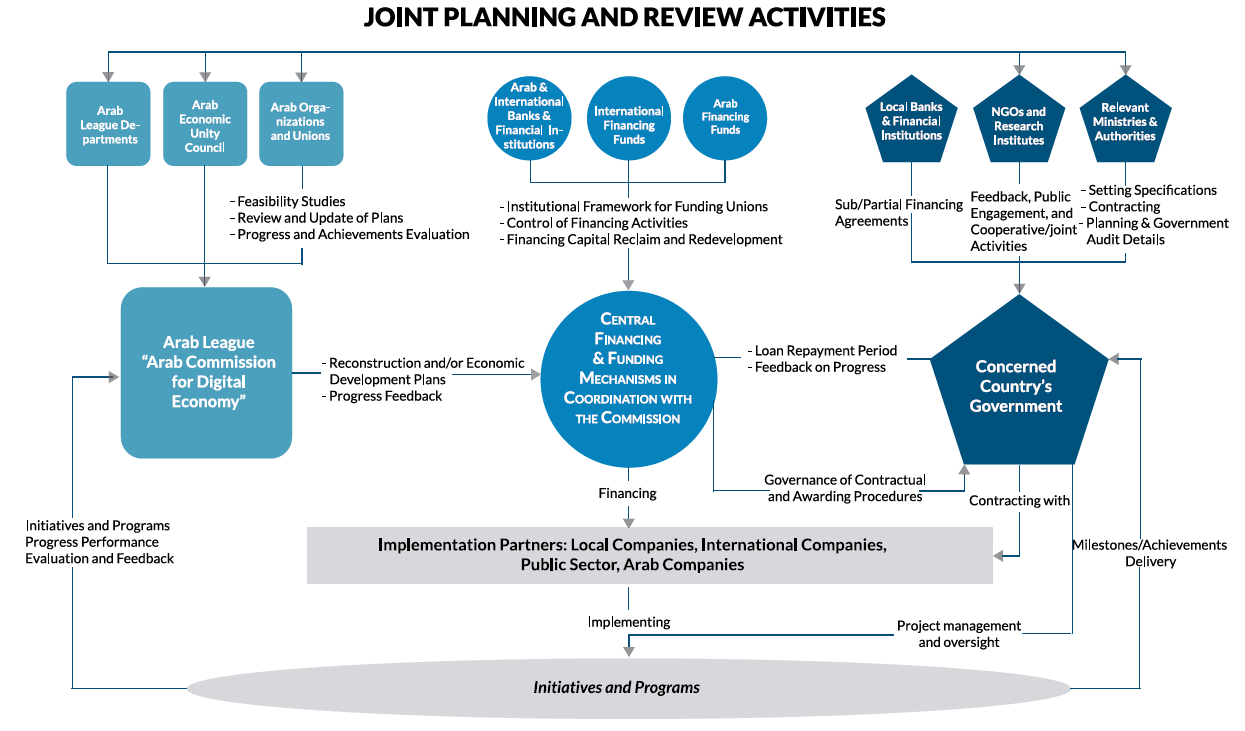
Figure 6: The Stakeholders of the Arab Digital Economy Strategy Implementation
Policy Guiding Principles towards an Arab Digital Economy
Implementing an ambitious and forward-looking strategy such as the Arab Digital Economy Vision is certainly not an easy task. Its scope includes 22 Arab countries and affects nearly half a billion people. In addition to this, the broad spectrum of economic and social structures of Arab countries poses a major challenge to successful implementation. What policy instruments can enable this transformation?
Policymakers at the helm of driving Arab economies towards the digital age would benefit from applying the following guiding principles when drafting regional and local policies. This will ensure that such policies will serve to create an enabling environment for the execution of the strategic vision.
Policy Framework
It is vital that the strategic vision and its initiatives are supported by a strong policy framework and a set of laws and regulations that can contribute to the adoption of digital transformation across all Arab nations. The framework must be designed to clearly depict both the mission and the high-level strategic directives which should, in turn, guide decisions, detailed policies, implementations and measurement of outcomes.
Human Capital
Building a digital infrastructure necessarily entails building competencies. This requires a strong education and training ecosystem to be put in place. The current model of education systems that are heavily reliant on rote learning need to be reformed in order to include cognitive learning processes. Investing in building human capital is as important as building for economic growth. In fact, human capital and economic growth are closely linked, as the former plays a key role in a nation’s production capacities, in creating employment opportunities and increasing both income levels and living standards. More targeted investments are needed for planning and supporting current education programmes and strategies to ensure building knowledge and skill-sets that can keep pace with changing market needs.
Knowledge Society
Knowledge in today’s digital world is considered a commodity to be traded for economic prosperity. Data, information and knowledge are replacing capital and energy as primary wealth-creating assets. As such, building a knowledge society is seen as paramount for national progress and global development, hence the central place it has occupied over the last two decades in global and regional agendas.
However, plans to build a knowledge society in most Arab countries appear to have remained in the theoretical realm. These countries have yet to truly transform into knowledge societies, where they need to not only leverage technology, but to increase capacity and develop conducive policy environments. This in turn, will empower these newly-formed knowledge-driven societies to develop into production societies, with robust export capabilities and capacities.[5]
A systemic, policy-driven transformation is required to strengthen the national knowledge ecosystems of the Arab countries, through focusing on innovation and entrepreneurship. Significant developments are also required to develop innovation and knowledge infrastructures such as national standards organizations and other systems that could be implemented as joint ventures of several countries. In fact, leveraging the strengths and infrastructures of neighboring countries and working towards the same objectives, may prove to be cost-effective.
Private Sector
Government support for the private sector should particularly be geared towards supporting micro businesses and small and medium-sized enterprises (SMEs). Digital transformation leaders have made this area a focal point of their activities across the globe. According to the European Commission, micro businesses and SMEs are considered the backbone of Europe’s economy, providing two-thirds of the total private sector employment in the EU. Despite the importance of SMES to employment and economic growth, especially in the digital age, they have garnered little attention and support from governments in Arab countries.
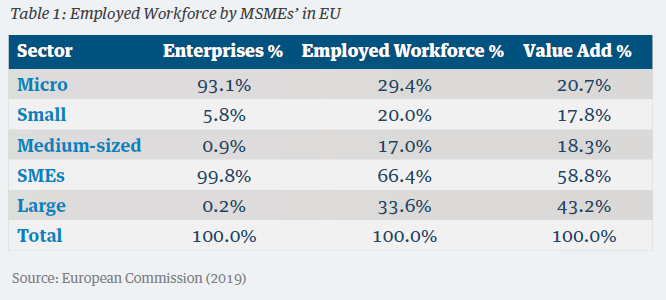
Table 1: Employed Workforce by MSMEs’ in EU – Source: European Commission (2019)
Arab countries need to address this issue of unemployment strategically by ensuring that the micro and SME sector, including start-ups, are promoted, supported and their outputs monitored in order to draw a clear picture of their impact on the economy. A new approach to SMEs is needed to ensure that they contribute actively to economic growth targets, innovation, and unemployment reduction.
Research and Innovation
A renewed focus on innovation and investments in research can enable the growth and development of sustainable economies. Yet, fostering and encouraging a research environment needs a conducive platform to attract talent that enables building a knowledge society, and contributing towards sustainable growth and economic development. Leaders of digital transformations view research and innovation as indispensable instruments for value creation and new employment opportunities. In fact, developed nations have attributed their sustained growth to their intensive research and investments in development.
While global spending on research and development has reached a record high of almost US$ 1.7 trillion (UNESCO, 2019), statistics show that ten countries account for approximately 80% of total spending.[6]
Research and development in Arab countries are not prioritized nor officially supported in regulatory texts with dedicated recurrent budgets. Arab spending on research and development is less than 0.5% of GDP. Furthermore, there is no clear link between policy-making and research institutions in the region. Arab countries need to allocate greater investments into research and development activities in both private and public sectors. Furthermore, these should be linked to national targets and recognized as an indispensable foundation for economic growth.
"Research and development in Arab countries are not prioritized nor officially supported in regulatory texts with dedicated recurrent budgets. Arab spending on research and development is less than 0.5% of GDP"
Regional Economic Coordination
Unquestionably, pan-regional joint action needs to be mobilized to build a collaborative Arab economy. Capacities can be built in some countries by catering to the needs of others. A classic example is the China and India success story, whereby China built manufacturing capacities while India built service capacities for the world. The result is that both of these economies – metaphorically described as a dragon and an elephant – continue to be some of the fastest growing economies in the world in the digital age.
A collaborative framework would prepare a combined workforce to cater for the current and future needs of the Arab world. Furthermore, the nearly half a billion Arabs constitute a huge captive consumer base. There are massive opportunities that can be achieved in the Arab world through closer cooperation on political, economic, cultural and social reforms.
Country-Level Policy Implications
A vision is just a starting point. Building a strong digital economy requires a number of enabling factors in addition to developing and implementing a strong strategic vision. Other policy implications to be addressed at a country-level include the following:
Digital Identity: The overall policy objectives highlighted in the strategy need to be focused on the promotion of digital transformation, supported by the development of ICT infrastructure and broadband capacities to create an inclusive digital society. As transformation implies more reliance on digital connectivity and the prevalence of data in cyberspace, governments also need to focus on cybersecurity challenges and threats to ensure the security of their citizens. Addressing security and trust in digital environments is necessary for an efficient and effective digital identity management system that would enable innovative models of public service delivery, planning and informed decision-making.[7] Absence of such platforms increases administrative burdens for businesses and individuals to authenticate identities in the virtual space. Related policies therefore need to mandate the provision of verified digital identity platforms that balance privacy and security requisites. The economic potential of digital identity in the digital ecosystem should not be underestimated.[8]
Financial Inclusion: In addition to this, in light of the growing global interest in financial inclusion as a driving force towards economic growth, related policies need not only to be designed to facilitate constituent access to secure financial services and products, but to target apt financial institutions to cater to the various needs of societal development and sustainable growth goals. Policies must ensure that high-level stated digital economy objectives accelerate the growth of a strong and well-organized structure of financial systems. Directives should include updating and creating new policy frameworks to promote investment, competition and innovation in this fast evolving sector.
Data for Economic Growth: The digital industrial revolution is a function of data management and data sharing. Policies thus need to be developed with an eye toward enabling a data-sharing ecosystem. Such ecosystems need to be planned at national and regional levels to succeed with digital transformation targets. Regulators and concerned departments in Arab countries must agree on the guiding principles for the development of digital cloud-based data-lakes, consisting of public data-set development and resource-based services, as a foundation to promote digitization in select business sectors. Relevant policies also need to address the application of open data, big data analytics and Artificial Intelligence as a backbone for decision making and innovation.
Finally, in light of the growing importance of the rapidly evolving roles of citizens and social sentiment, policies need to encourage active citizen engagement and citizen-driven planning in laying down the roadmaps of the digital economy.
A Common Regional Strategy – The Key for a Thriving Digital Economy
Global economic trends indicate that traditional economic growth rates are stagnant or falling while digital economy growth rates are increasing at double the speed. Governments are pressured to transition away from the status quo and adopt more creative and innovative economic models and structures. In order to achieve this, they must build complex and large-scale capacities to address global challenges and uncertainties.
In the Arab region, the general approach to these issues has so far been reactionary offering temporary solutions with short-term outlooks. This is quite evident from current indicators of competitiveness.
The Arab Digital Economy Strategic Vision presents a real opportunity to develop an integrated regional vision, and achieve sustainable transformations. The holistic approach utilized by the strategy has the potential to enhance social, economic and sustainable development in the region.
The strategic initiatives aim to develop critical sectors such as government service, education and digital capacity building and SMEs, and promote job creation, innovation, competition, and social welfare. The vision calls for Arab governments to collaborate and invest in building the future of their nations.
The policy framework requirements postulated here seek to set the agenda for much-needed digital transformation in the Arab World and can be used as a guide for accelerated growth in the region.
Technological developments can be described metaphorically as hurricanes that will upheave existing social and economic structures and develop new conceptual and practical maps, which societies will have to accept and adapt to. Passive and reactive national policies, or reliance on individual action plans, will not only be unfeasible, but impossible. Countries in the region need to take a strategic coordinated approach towards economic transformation if they are to take advantage of the economic growth potential in the digital age.
Ali Al-Khouri is the Advisor to the Arab Economic Unity council, and Chairman of the Arab Federation for Digital Economy in the Arab League. Read full bio here.
References:
Al-Khouri, A.M. (2013) Workforce Nationalisation between the Supply and Demand: A Study of the Reality of Workforce Nationalisation in the Arab World and its Prerequisites, Strategic Vision, 4: 8-51.
Al-Khouri, A.M. (2015) Program Management of Technology Endeavours: Lateral Thinking in Large Scale Government Program Management. London: Palgrave Macmillan.
Al-Khouri, A.M. (2016) Smart Government: Circle of Attention. Egypt: Arab Administrative Development Organization.
Al-Khouri, A.M. (2018) Electronic Government for the 21st Century. Egypt: Arab Administrative Development Organization.
- EU. The digital economy and society index (DESI): European Commission. 2019. [cited 2019 Jun 24]. Available from: https://ec.europa.eu/digital-single-market/en/desi
Deloitte (2015) Connected health: How digital technology is transforming health and social care. Deloitte Centre for health Solutions https://www2.deloitte.com/content/dam/Deloitte/uk/Documents/life-sciences-health-care/deloitte-uk-connected-health.pdf
EU (2019) Entrepreneurship and Small and medium-sized enterprises (SMEs). European Commission. https://ec.europa.eu/growth/smes_en
Fitzgerald, M., Kruschwitz, N., Bonnet, D. and Welch, M. (2004) Embracing Digital Technology: A New Sstrategic Imperative. MIT Sloan Management Review, 55:1-12.
IMD (2019) IMD World Digital Competitiveness Ranking 2019. https://sloanreview.mit.edu/projects/strategy-drives-digital-transformation/
ITU (2018) The economic contribution of broadband, digitization and ICT regulation. https://www.itu.int/en/ITU-D/Regulatory-Market/Documents/FINAL_1d_18-00513_Broadband-and-Digital-Transformation-E.pdf
Kane G.C., Palmer D., Phillips A.N., Kiron, D. and Buckley, N. (2015) Strategy, Not Technology, Drives Digital Transformation. MIT Sloan Management Review, 14:1–25.
Kumar, A.P. (2018) Lessons from the World’s Largest e-Identity Program – India’s Aadhaar. https://procivis.ch/2018/02/13/lessons-from-the-worlds-largest-e-identity-program-indias-aadhaar/
McKinsey (2019) Digital Identification: A Key to Inclusive Growth. https://www.mckinsey.com/business-functions/mckinsey-digital/our-insights/digital-identification-a-key-to-inclusive-growth
Petersen, T. (2019) Digital Economy: How is digitalization changing global competitiveness and economic prosperity?. Global Economic Dynamics. https://ged-project.de/blogpostsen/digital-economy-how-is-digitalization-changing-global-competitiveness-and-economic-prosperity/
Rillo, A. D. (2018) Understanding the Digital Economy: What Is It and How Can It Transform Asia? https://www.adb.org/news/events/understanding-digital-economy-what-it-and-how-can-it-transform-asia
Statista (2019) Unemployment rate in selected world regions between 2015 and 2018. https://www.statista.com/statistics/279790/unemployment-rate-in-seclected-world-regions/
UNCTAD (2019) Digital Economy Reprot 2019: Value Creation and Capture – Implications for Developing Countries. United Nations. https://unctad.org/en/PublicationsLibrary/der2019_overview_en.pdf
UNESCO (2019) How much Does you country invest in R&D? UNESCO Institute for Statistics. http://uis.unesco.org/apps/visualisations/research-and-development-spending/
WEF (2018) The Arab World Competitiveness Report 2018. World Economic Forum. http://www3.weforum.org/docs/Arab-World-Competitiveness-Report-2018/AWCR%202018.0724_1342.pdf
WEF (2019) Global Competitiveness Report 2019: How to end a lost decade of productivity growth. World Economic Forum. http://www3.weforum.org/docs/WEF_TheGlobalCompetitivenessReport2019.pdf
Endnotes:
[1] The IMD World Digital Competitiveness Ranking measures the capacity and readiness of 63 economies to adopt and explore digital technologies as a key driver for economic transformation in business, government and wider society. The 2019 report is available here: https://www.imd.org/wcc/world-competitiveness-center-rankings/world-digital-competitiveness-rankings-2019/
[2] 2019 Global Competitiveness Report: http://www3.weforum.org/docs/WEF_TheGlobalCompetitivenessReport2019.pdf
[3] This strategic vision was launched in the United Arab Emirates at the end of 2018 in the presence of representatives from all Arab countries
[4] Cluster 1: Iraq, Libya, Syria and Yemen, as well as Algeria, Comoros, Djibouti, Mauritania, Palestine, Somalia and Sudan. Cluster 2: Egypt, Jordan, Lebanon, Morocco and Tunisia. Cluster 3: Saudi Arabia, UAE, Bahrain, Kuwait, Oman and Qatar.
[5] Al-Khouri, A.M. (2017) Electronic Commerce and its Role in Advancing Arab Interregional Trade. Egypt: Arab Federation for E-Commerce, Arab League.
[6] These countries are: United States, China, Japan, Germany, Korea, France, India, United Kingdom, Brazil, and Russia.
[7] Al-Khouri, A.M. (2014) "Digital Identity: Transforming GCC Economies." Research, Innovation and Entrepreneurship Reforms in Gulf Cooperation Council (GCC) Countries, Journal of Innovation management, Policy, and Practice, 16(2): 3594-3617.
[8] McKinsey estimates that digital identity systems can help achieve 3% of economic value equivalent of GDP in developed economies and up to 6% in developing economies (McKinsey, 2019). For instance, in Germany, with a current GDP of approximately $3.6 trillion this would be an equivalent of more than $108 billion per year. The Digital ID and Authentication Council of Canada (DIACC) estimates the potential value of trusted digital identity to the Canadian economy being at least 1% of GDP, and $4.5 billion of annual added value to small and medium-sized enterprises. In India, 309 million new bank accounts were opened owing to the reduced KYC costs made possible through digital identities (Kumar 2018).



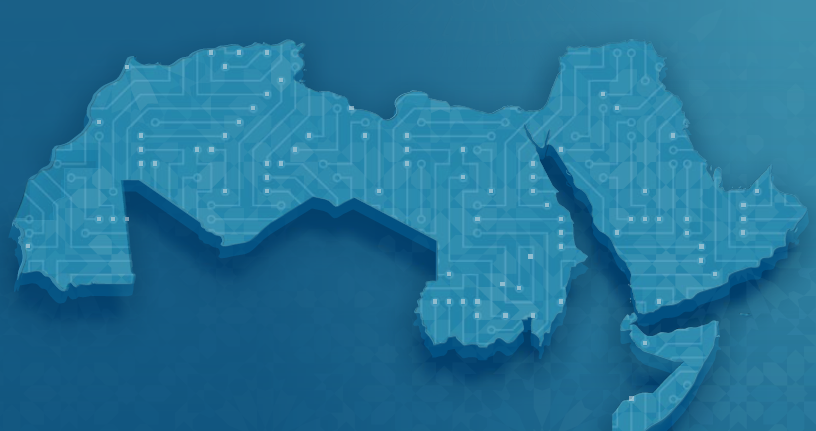
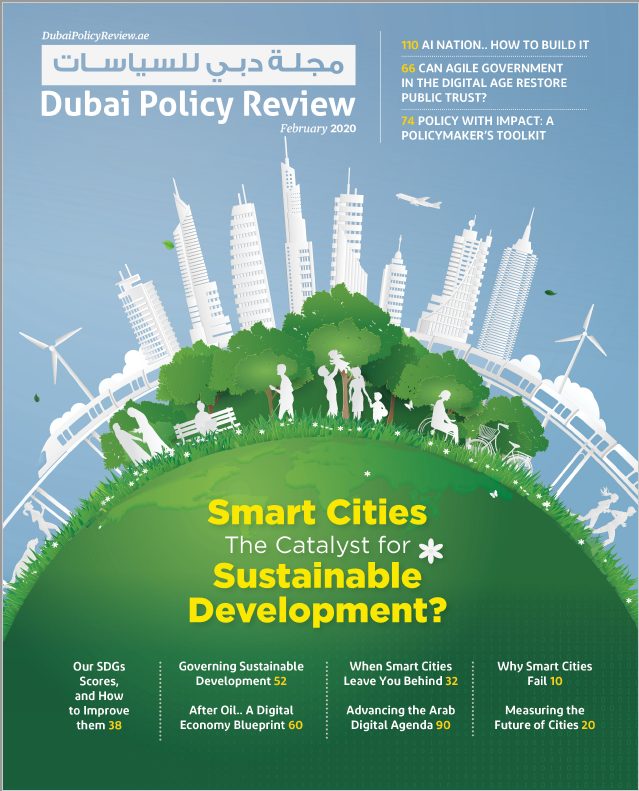











Smart Cities.. The Policy Catalyst for Sustainable DevelopmentAugust 7, 2020 7:00 pm
[…] digital transformation at the core (El-Sherbiny, UN ESCWA). A key part of which will rely on building a future-facing digital economy that adapts to the knowledge economy era (Al-Khouri). However, to achieve these ambitious […]